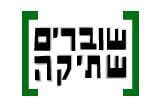Too often, when it comes to reporting on Israel and the Palestinians, unverified “eyewitnesses” or unnamed sources are a feature of media stories, especially those that impact negatively on Israel.
And so it is with a story concerning the Breaking the Silence organization, which has published a collection of soldiers’ testimonies about last year’s Gaza war. It is covered widely by international media outlets, including CNN, BBC, NPR, The Guardian, Daily Telegraph, Sydney Morning Herald, The Independent (links one and two), Financial Times (click via Google News), and the London Review of Books (by radical left-wing Israeli Professor Neve Gordon). Reuters, for example, writes:
Israel inflicted “massive and unprecedented harm” to Palestinian civilians in the 2014 Gaza war with indiscriminate fire and lax rules of engagement, a report said on Monday, citing testimony given anonymously by dozens of troops.
The 237-page report by the Israeli advocacy group Breaking the Silence described how Israel Defence Forces (IDF) left swathes of devastation after they invaded Gaza last July with the stated aim of halting Hamas rocket fire out of the enclave.
“We were firing purposelessly all day long. Hamas was nowhere to be seen,” one tank sergeant was quoted as saying.
The group said its finding cast “grave doubt on the IDF’s ethics”.
 But what about the warped journalistic ethics behind the reporting of this story? Clearly the Breaking the Silence story is based entirely on anonymous testimonies. In essence, the media are using Breaking the Silence as a middleman to avoid due diligence on the sources.
But what about the warped journalistic ethics behind the reporting of this story? Clearly the Breaking the Silence story is based entirely on anonymous testimonies. In essence, the media are using Breaking the Silence as a middleman to avoid due diligence on the sources.
Breaking the Silence’s report doesn’t meet the accepted standards that journalists themselves apply to their own reports.
And what about questioning the motivations behind Breaking the Silence? As journalist Jake Wallis Simons recounted back in 2013 when he conducted interviews with BtS staff:
It was only a hunch at first. But later, the bias of the organisation became clearer. During a break between interviews, I asked Yehuda Shaul, one of the founders of the organisation, how the group is funded. It was with some surprise that I learned that 45 per cent of it is donated by European countries, including Norway and Spain, and the European Union. Other donors include UNICEF, Christian Aid and Oxfam GB. To me this seemed potentially problematic.
As is the case in all democracies, the IDF is an organ of the state, not a political decision-maker. If the goal of Breaking the Silence was simply to clean up the Israeli military, it wouldn’t be such a problem. Instead, the aim is to “end the occupation”, and on this basis it secured its funding.
It appeared, therefore, that these former soldiers, some of whom draw salaries from Breaking the Silence, were motivated by financial and political concerns to further a pro-Palestinian agenda. They weren’t merely telling the truth about their experiences. They were under pressure to perform.
Indeed, I later discovered that there have been many allegations in the past that members of the organisation either fabricated or exaggerated their testimonies.
NGO Monitor also notes the foreign government and NGO donations that funded Breaking the Silence’s latest publication and exposes:
Contrary to BtS’ claim that “the contents and opinions in this booklet do not express the position of the funders,” NGO Monitor research reveals that a number of funders made their grants conditional on the NGO obtaining a minimum number of negative “testimonies.” This contradicts BtS’ declarations and thus turns it into an organization that represents its foreign donors’ interest, severely damaging the NGO’s reliability and its ability to analyze complicated combat situations.
You can read NGO Monitor’s initial analysis of the Breaking the Silence publication here, which highlights some serious flaws.
But this hasn’t stopped the media from relying on anonymous testimonies to affirm Israeli guilt. As HonestReporting has previously noted concerning anonymous sources, a lack of transparency raises doubts about the quality of the journalism and trust in the reporter. It’s a leap of faith.
In this latest case, journalistic ethics appear to be secondary.


